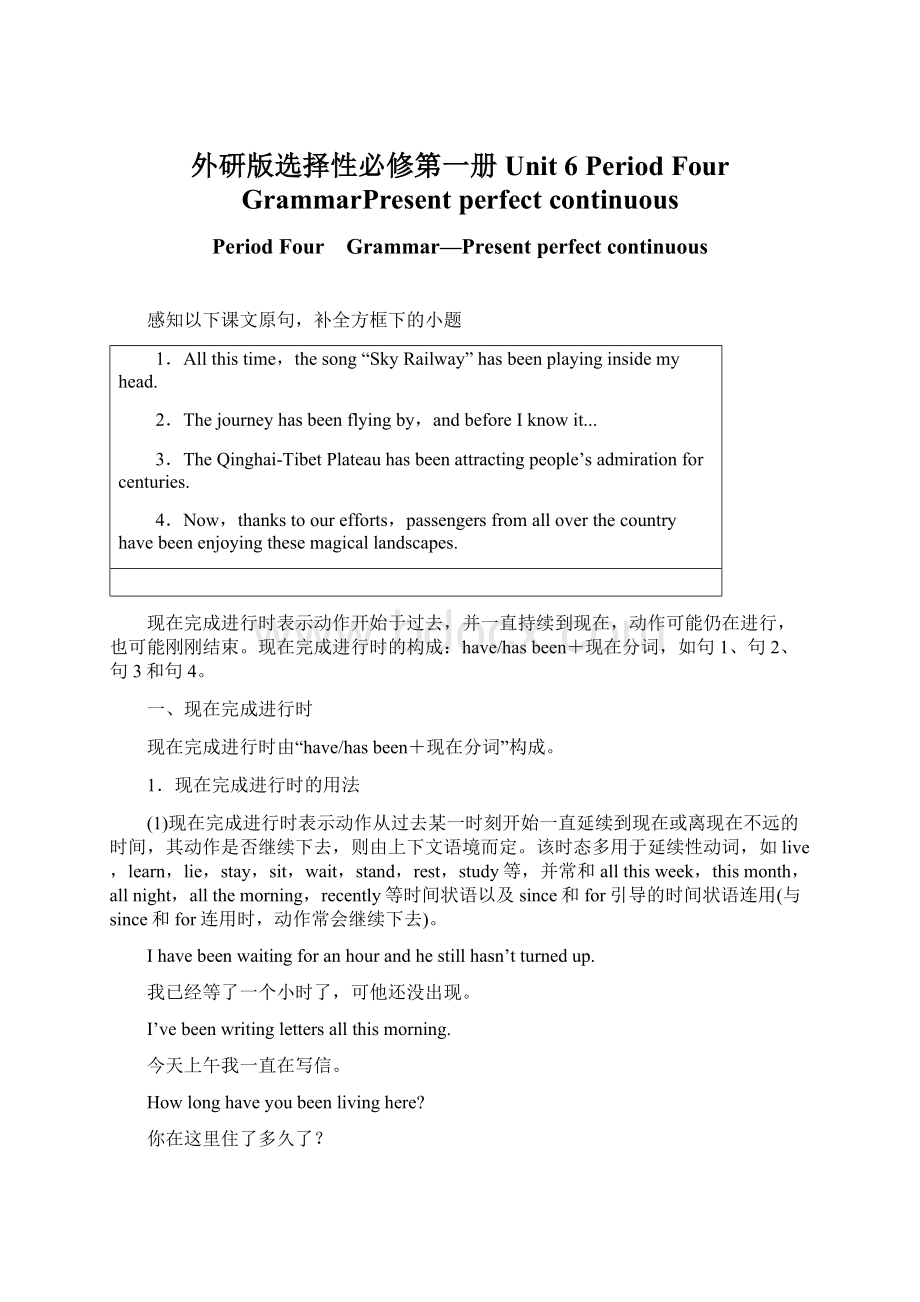外研版选择性必修第一册Unit 6 Period Four GrammarPresent perfect continuous.docx
《外研版选择性必修第一册Unit 6 Period Four GrammarPresent perfect continuous.docx》由会员分享,可在线阅读,更多相关《外研版选择性必修第一册Unit 6 Period Four GrammarPresent perfect continuous.docx(11页珍藏版)》请在冰豆网上搜索。

外研版选择性必修第一册Unit6PeriodFourGrammarPresentperfectcontinuous
PeriodFour Grammar—Presentperfectcontinuous
感知以下课文原句,补全方框下的小题
1.Allthistime,thesong“SkyRailway”hasbeenplayinginsidemyhead.
2.Thejourneyhasbeenflyingby,andbeforeIknowit...
3.TheQinghai-TibetPlateauhasbeenattractingpeople’sadmirationforcenturies.
4.Now,thankstoourefforts,passengersfromalloverthecountryhavebeenenjoyingthesemagicallandscapes.
现在完成进行时表示动作开始于过去,并一直持续到现在,动作可能仍在进行,也可能刚刚结束。
现在完成进行时的构成:
have/hasbeen+现在分词,如句1、句2、句3和句4。
一、现在完成进行时
现在完成进行时由“have/hasbeen+现在分词”构成。
1.现在完成进行时的用法
(1)现在完成进行时表示动作从过去某一时刻开始一直延续到现在或离现在不远的时间,其动作是否继续下去,则由上下文语境而定。
该时态多用于延续性动词,如live,learn,lie,stay,sit,wait,stand,rest,study等,并常和allthisweek,thismonth,allnight,allthemorning,recently等时间状语以及since和for引导的时间状语连用(与since和for连用时,动作常会继续下去)。
Ihavebeenwaitingforanhourandhestillhasn’tturnedup.
我已经等了一个小时了,可他还没出现。
I’vebeenwritinglettersallthismorning.
今天上午我一直在写信。
Howlonghaveyoubeenlivinghere?
你在这里住了多久了?
(2)有时现在完成进行时所表示的动作并不是一直在不停地进行,而是在断断续续地重复。
这时现在完成进行时可用于瞬间动词。
He’sbeenshavingsincelastyear.
他从去年开始就一直刮脸。
Youhavebeensayingforayearthatyouwillstudyabroad.整整一年你都在说要出国学习。
2.现在完成进行时中时间状语的省略
现在完成进行时在上下文清楚时亦可不用时间状语。
这种现在完成进行时多指“刚才”或“近来”发生的动作,一般不再继续,并往往含有一种直接的结果。
You’vebeenworkingtoohard.
你工作太辛苦了。
(直接结果可能是你一定很累了)
You’vebeensmokingagain.
你又抽烟了。
(暗含结果是你身上有烟味)
Who’sbeeninsultingyou?
谁欺负你了?
(对方可能在哭)
3.现在完成进行时的感情色彩
现在完成进行时和其他进行时态一样,也可以带有感情色彩。
Ihavebeenwantingtomeetyouforalongtime.
和你见面是我盼望已久的事。
Toomuchhasbeenhappeningtoday.
今天发生太多事了。
二、现在完成进行时与现在完成时
现在完成进行时是兼有现在完成时和现在进行时二者基本特点的时态。
由于它有现在完成时的特点,所以它可以表示某一动作对现在产生的结果或影响;由于它有现在进行时的特点,所以它也可以表示某一动作的延续性、临时性、重复性、生动性乃至感情色彩。
现在完成时和现在完成进行时的比较:
1.现在完成进行时可以表示动作的重复,而现在完成时一般不表示重复性。
Haveyoubeenmeetinghimrecently?
你最近常和他见面吗?
Haveyoumethimrecently?
你最近见过他吗?
2.现在完成进行时有时含有感情色彩,而现在完成时一般是平铺直叙。
Ihavebeenwaitingforyoufortwohours.
我一直等了你两个小时。
(可能表示不满)
Ihavewaitedforyoufortwohours.
我等了你两个小时。
(说明一个事实)
3.现在完成进行时强调动作,而现在完成时强调结果。
Whohasbeeneatingtheoranges?
谁一直在吃橘子呀?
(还剩余一些)
Whohaseatentheoranges?
谁把橘子吃了?
(强调吃得一个不剩)
4.有些动词不能用于现在完成进行时,但可用于现在完成时。
如:
表示状态的动词:
be,have,exist等;表示感情的动词:
like,love等;表示感觉的动词:
see,hear,know等。
Hehashadacoldforaweek.
他已经感冒一周了。
IhavelikedjazzsinceIwasateenager.
从青少年起我就喜欢爵士乐了。
Ihaveknownherforalongtime.
我已经认识她很长时间了。
5.与一段时间连用时可以用现在完成时也可以用现在完成进行时;但与“次数”连用时只能用现在完成时,不能用现在完成进行时。
6.这两种时态都可以表示动作的延续,区别在于:
现在完成进行时更强调动作的延续性,可以说是现在完成时的强调形式。
Wehavebeenlivingherefortenyears.
Wehavelivedherefortenyears.
我们在这里住了十年了。
7.在没有时间状语的情况下,现在完成进行时表示动作仍在进行,而现在完成时则表示动作到现在已经结束。
Thestudentshavebeenpreparingfortheexam.
学生们一直在为考试做准备。
(还在进行)
Thestudentshavepreparedfortheexam.
学生们已经为考试做了准备。
(已经结束)
Ⅰ.用所给词的适当形式填空
1.ItisthemostinstructivelecturethatIhaveattended(attend)sinceIcametothisschool.
2.Yearsagowedidn’tknowthis,butrecentsciencehasshown(show)thatpeoplewhodon’tsleepwellgetilleasily.
3.Thetwofriendshavebeenchatting(chat)ontheInternetforthreehours,andtheywillgoontillnextmorning.
4.—Howlonghaveyoubeenworking(work)inthefactory?
—Since1990.
5.Thefirstuseofatomicweaponswasin1945,andtheirpowerhasbeenincreasing(increase)enormouslyeversince.
6.—Doyouregretnothavinggoneabroad?
—Notatall.Ihaven’tearned(not,earn)asmuch,butI’mgladtocontributetoourmotherland.
7.—Oh,no!
We’retoolate.Thetrainhasleft(leave).
—That’sOK.We’llcatchthenexttraintoLondon.
8.Inordertofindthemissingchild,villagershavebeendoing(do)alltheycanoverthepastfivehours.
9.Themanagerhasbeentelling(tell)theworkershowtoimprovetheprogramsince9am.
10.—Look!
Somebodyhascleaned(clean)thesofa.
—Well,itwasn’tme.Ididn’tdoit.
Ⅱ.完成句子
1.Yourclothesarecoveredwithdust.Youhavebeencleaningtheclassroom,Ithink.
你的衣服满是灰尘,我想你刚才一直在打扫教室吧。
2.Youlookthinandtired.Youhavebeenworkingtoohard.
你看起来又瘦又累,你近来工作一定很辛苦。
3.You’vebeensayingyoucansucceedforfiveyears.
五年来你一直在说你能成功。
4.IhavebeenvisitingsomecitiesofChinathismonth.
这个月我一直在访问中国的几个城市。
5.Ihavebeenreadingthisbookfortwohours,butIhaven’tfinishedit.
这本书我已读了两小时了,但我还没读完。
基础巩固
Ⅰ.单句语法填空
1.Shehasbeenreciting(recite)thewordsalltheevening.
2.IworkinAmericanow,butIworked(work)inJapanfortenyears.
3.Thousandsoffilmshavebeenproduced(produce)allovertheworldsofar.
4.Itisthefirsttimethatshehasread(read)suchaninterestingbook.
5.Youhavebeensitting(sit)atthecomputerallday.Youmustbetired.
6.IlovecominghereandseeingmyfamilyandallthefriendsIhavemade(make)overtheyears.
(2019·全国Ⅱ)
7.Forthepasttwoyears,Gordon’sstudentshavebeenstudying(study)waystokillbacteriainzerogravity.(2019·全国Ⅱ)
8.Thetelephonehasbeenringing(ring)foralmostaminute,whydoesn’tsomeoneanswerit?
9.Since2011,thecountryhasgrown(grow)morecornthanrice.(2018·全国Ⅱ)
10.Ihaveread(read)halfoftheEnglishnovel,andI’lltrytofinishitattheweekend.
Ⅱ.单句写作
11.整个早上这个年轻人一直站在窗边。
(stand)
Theyoungmanhasbeenstandingbythewindowthewholemorning.
12.我已经完成了设计,所以我要去海边休息一下。
(finish)
Ihavefinishedthedesign,soIwillgotothebeachtohavearest.
13.这个女孩丢了钥匙,她到处都找不到。
(lose)
Thegirlhaslostherkeys.Shecan’tfindthemanywhere.
14.你到底为什么一直在那里大声喧哗?
(talk)
Whyisitthatyouhavebeentalkingsoloudlythere?
15.她的眼睛红红的,显然哭了很长时间了。
(cry)
Hereyesarered.Itisobviousthatshehasbeencryingforalongtime.
能力提升
Ⅲ.阅读理解
Onethingthetourbooksdon’ttellyouaboutLondonisthat2,000ofitsresidentsarefoxes.Theyranawayfromthecityaboutcenturiesagoafterdevelopersandpollutionmovedin.Butnowthattheenvironmentiscleaner,thefoxeshavecomehome.
“Thenumberandvarietyofwildanimalsinurbanareasareincreasing,”saysCornerJones.AsurveyofthewildlifeinNewYork’sCentralParklastyearcounted14kindsofanimals.Asimilarsurveycarriedoutinthe1890’scountedonlyfivekinds.
Severalchangeshavebroughtwildanimalstothecities.First,theairandwaterqualityinmanycitieshaveimprovedasaresultofthe1970spollution-controlefforts.Meanwhile,ruralareashavebeenbuiltup,andmanyanimalshavegonetotheareaoutsidethecentreofacity.Inaddition,urbanwildliferefuges(避难处)havebeencreated.TheGreaterLondonCouncillastyearspent$750,000buyinglandandbuilding10permanentwildliferefugesinthecity.Asaresult,manybirdsarenowlivinginthecity.By1970thebirdshaddiedouteastoftheMississippibecausetheDDThadmadetheireggstoothintosupportlife.Thatyear,scientistTomCadeofCornellUniversitybeganraisingthebirdsforreleaseincities,forcitiesaffordedabundantfood.
Citiescanattractwildanimalswithoutturningthemharmful.Thekeyistocreatehabitatswheretheyareabletolivehappily.Suchhabitatscanevenbeuseful.InSanFrancisco,thelocalgovernmentistestingdifferentkindsofrainwatercontrolbasinstoseenotonlywhichoneskeepthecleanestwaterbutwhichwillattractthemostbirds.
16.Whatisthepassagemainlyabout?
A.2,000foxesreturningtoLondon.
B.Wildanimalslivinginzoos.
C.Wildlifereturningtosomelargecities.
D.Thegreatenemyofwildlife.
答案 C
解析 主旨大意题。
根据全文内容可知,本文介绍了因为一些大城市的环境变好等因素,野生动物重新回到城市里繁衍生息。
17.Itcanbeinferredfromthepassagethat.
A.Londonersareputtingmoreandmorewildanimalsintotheirzoos
B.Londonersarehappytoseewildanimalsreturntotheircity
C.Londonersaretryingtomovewildanimalsbacktothecountryside
D.Londonershavewelcomedthewildbirds,butfoundfoxesaproblem
答案 B
解析 推理判断题。
根据文章前三段的叙述可知,野生动物回归城市是环境变好的体现,同时人们也在积极地为这些野生动物来营造更好的栖息地,这说明伦敦人很高兴看到野生动物回到他们的城市。
18.Accordingtothepassage,thenumberofspeciesofwildlifeinNewYork’spark.
A.isslowlygoingdown
B.isthesameasthatinothercities
C.doesn’tchangetoomuch
D.hasmorethandoubledinthelastcentury
答案 D
解析 细节理解题。
根据文章第二段中的“AsurveyofthewildlifeinNewYork’sCentralParklastyearcounted14kindsofanimals.Asimilarsurveycarriedoutinthe1890’scountedonlyfivekinds.”可知,纽约中央公园的野生动物的种类在过去的100多年里增长了一倍多。
19.WhichofthefollowingisNOTareasonwhywildlifeisreturningtothecities?
A.Thereisplentyoffoodforwildlifeincities.
B.Wildlifeenjoysbeingwatchedandfedinthecities.
C.Moreandmorespeciallivingareashavebeenbuiltforthewildlife.
D.Airandwaterqualityhaveimprovedinthecities.
答案 B
解析 细节理解题。
第三段谈到了野生动物回归城市生活的原因,唯独没有提到B项,B项的句意是:
野生动物喜欢在城市里被人们观看和喂养。
Ⅳ.完形填空
CiudadPerdida,Colombia’s“LostCity”isolderthanMachuPicchu.Therearenotrainsorbusesallowingof20travelstoreachitsruins.Theremoteplaceisonly21onfoot:
atiringmulti-dayhike.
Despitethis,Icouldn’t22theopportunitytovisitCiudadPerdida.12otherhikersandIwenttherein23withalicensedguide.Thedirtpath,which24throughtoweringpalmsanddanglingvines(藤蔓),proved25rightfromthestart.Alongthewaywealsometthe26.Theyhavebeenleftundisturbedforcenturiesandthere’sadeep27betweenthemandtheland.
Thenextmorning,wewereoffearlyto28theheat,buthightemperaturesandmusclepainhadalready29bythetimewereachedthefinalstage—1,200stonestepsto30.Afterfinallyliftingmypainfulbodyupthelongflightofstairs,myeyesrestedonthescenethathad31thebackbreakingjourney:
CiudadPerdida.
Ilookeddownandwonderedatthebeautifulsitebelow.Whilethereturntripincluded32thementalhurdle(障碍)ofhavingalreadyaccomplishedourgoal,theexperienceistheoneIwoulddo33.Itisthedifficultythatmakesthejourneyamore34one.Earnedviewsarealwaysbetter.
语篇解读 本文为一篇记叙文,主题语境是“人与自我”。
哥伦比亚的“失落之城”佩尔迪达城比马丘比丘还要古老。
作者在导游的带领下和其他徒步旅行者一起不辞劳苦抵达这